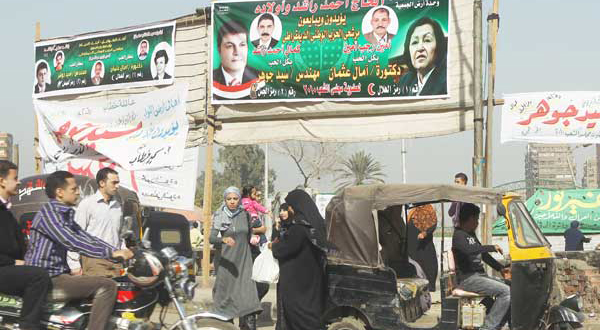 CAIRO: Female opposition candidates said the 64-seat quota allocated for women in the 2010 parliamentary elections proved a “failure” and described it as “a method to guarantee the ruling National Democratic Party’s (NDP) additional seats in the People’s Assembly.”
CAIRO: Female opposition candidates said the 64-seat quota allocated for women in the 2010 parliamentary elections proved a “failure” and described it as “a method to guarantee the ruling National Democratic Party’s (NDP) additional seats in the People’s Assembly.”
“The quota law failed miserably, it resulted in merely adding seats in parliament in favor of the NDP,” Mona Al-Qurashi, member of the executive bureau of Al-Wafd Party and one of its candidates in Assiut, told Daily News Egypt.
“The female NDP candidates who won the elections in Assiut didn’t contest fairly for their seats, they depended on security forces and their representatives to do that for them,” Al-Qurashi said.
“I toured the whole governorate of Assiut to meet the people, but the people of Upper Egypt couldn’t even fathom what the quota meant and how to vote for the women,” she added.
Muslim Brotherhood candidate running for the women’s quota in Giza, Amal Abdel Kerim, accused the NDP of rigging the elections in their favor.
”The elections weren’t just rigged against the Brotherhood’s female candidates, they were rigged against all Brotherhood candidates with the help of state security and the Supreme Electoral Commission (SEC),” Abdel Kerim told Daily News Egypt.
“I toured 16 polling stations in Dokki, Agouza and Al-Haram districts and found the doors shut in the faces of voters,” Abdel Kerim said.
Abdel Kerim said that none of her representatives were allowed inside the polling stations like other Brotherhood candidates despite having notarized permits allowing them to do so.
“The polling station in Hoda El-Shaarawy school [in Shoubra Al-Kheima district] was completely sealed off and there were bullies guarding the doors,” she said.
“The female voters in Geziret El-Dahab in Giza were simple illiterate women, they were given forged ballots in favor of the ruling National Democratic Party candidates in exchange for LE 50 each,” she added.
“The real ballot boxes were spotted being switched with rigged ballot boxes on the day of the elections.
“The quota was implemented in order to appease laws that serve the western agenda for women and the international women’s rights organizations not to serve Egypt.
”Many of these laws conflict with Islamic Sharia and the Egyptian culture and traditions including inheritance laws,” Abdel Kerim added.
Gamila Ismail, independent female candidate who contested against NDP candidate Hisham Moustafa Khalil in Qasr El-Nil district, told Daily News Egypt, “The NDP created the quota law at this specific time to win an excessive majority of seats in the parliament before the 2011 presidential elections.”
Ismail filed eight complaints to the SEC for rigging the ballot boxes and the people’s votes.
Ismail said that only one of her complaints was accepted by the SEC, which cancelled 300 votes out of 1,800 which were in favor of Khalil.
“I expected there to be rigging and violations in the elections,” Ismail said. “But 1,300 people voted for me in a district where nobody usually votes, I see that as a positive sign.”
Ismail hailed the Wafd and Brotherood’s decision to withdraw from the runoff elections on Dec. 5, amid accusation of fraud and rigging the preliminary elections.
“We fought the NDP in the first round of elections, but the NDP wants to be the only player in the field, so let them have that,” Ismail said.
Opposition and rights groups accused the NDP of many violations, including ballot stuffing, vote rigging and denying the representatives of various opposition parties’ entry into the polling stations despite their possession of notarized permits.
The ruling NDP won 217 parliamentary seats in the first round, while Egypt’s largest opposition group, the Muslim Brotherhood, got none, despite having won 88 seats in 2005, representing nearly 20 percent of the outgoing parliament.
Al-Wafd won only two seats. None of the opposition groups’ female candidates won a single seat reserved from the women’s quota.
NDP candidate and winner in Giza, Khadiga Osman, denied accusations of fraud in rigging in the PA elections. “The ides of the quota is still very fresh, I was so surprised to hear the fraud allegations, there elections were completely fair and transparent,” she said.
Osman criticized the two main opposition groups’ decision to withdraw from the elections, describing them as “weak.”
“This shows that they are too weak to confront a powerful, popular party like the NDP.”
However Osman agreed that the people in Egypt need more awareness regarding the women’s quota
“I had to explain to the people in the governorate the meaning of the quota and how it asserts women’s role and responsibility in the community,” Osman said.
“It’s also a tiring experience because women are running for a whole governorate not a certain constituency, so touring the polling stations in a governorate within a limited time frame was difficult,” she explained.
The women’s quota system was implemented in Egypt for the first time in 1979, but it was ruled unconstitutional and cancelled in 1986.
With the help of the National Council for Women, the 2007 constitutional amendments reintroduced the female quota system, followed by a law passed by parliament last February that officially reinstated the women’s quota system, awarding women 64 seats through 32 constituencies.
“The quota is still in process, we need to start evaluating its success after a year or so,” Osman said.



